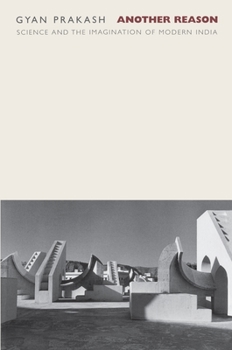Another Reason: Science and the Imagination of Modern India
Select Format
Select Condition 
Book Overview
Another Reason is a bold and innovative study of the intimate relationship between science, colonialism, and the modern nation. Gyan Prakash, one of the most influential historians of India writing today, explores in fresh and unexpected ways the complexities, contradictions, and profound importance of this relationship in the history of the subcontinent. He reveals how science served simultaneously as an instrument of empire and as a symbol...
Format:Paperback
Language:English
ISBN:0691004536
ISBN13:9780691004532
Release Date:August 1999
Publisher:Princeton University Press
Length:344 Pages
Weight:1.05 lbs.
Dimensions:0.8" x 6.3" x 9.2"
Customer Reviews
3 ratings
Indian Modernity Is Inseparable From Science's Authority
Published by Thriftbooks.com User , 17 years ago
Every nation born out of decolonization shares a certain faith in the emancipatory powers of science. Perhaps this blind reverence to the lights of reason was a sign of the times when they gained their independence, hoping to find a third way between capitalism's drive for modernization and socialism's social engineering. Or perhaps the positivist creed was implanted in their collective mind much before, under the authority of their colonial master, or again perhaps it developed independently as a mean to seize their own destiny and claim for themselves the age of reason that was denied to them. To capture reason's mirror image into the world of collective beliefs and representations, and to analyze the dreams that science inspired, one needs to develop tools that are more sensitive than the conceptual apparatus commonly used by the historian. Michel Foucault's genealogical approach offer such frame of analysis, and this is why the French philosopher has found a wide following among anthropologists and other social scientists. However, Foucault paid little attention to colonialism in outlining his key concepts, and he neglected the role that empires played in the formation of modern disciplines such as political economy or demographics. Given Foucault's view that governmentality and biopower, two key notions that marked the entry into modernity, were constituted fully within the borders of the West, their career in the colonies, in societies marked by their failure to achieve the "threshold of modernity", can only be seen as a dim reflection of their metropolitan original. In Another Reason, Gyan Prakash shows that the scientific imagination that developed among the colonized elites of India wasn't a simple replica of the status and representations attached to science in Victorian England. In order to wield its transforming power, "science had to be tropicalized, brought down to the level of the natives and even forced upon them." Science went native in colonial museums that displayed the wonders of science and therefore appealed to imagination and to superstition as much as to reason, or in the creation of new technologies of government, such as tropical medicine or national accounting, that later found their way into Western societies. But colonial rule also allowed for indigenous agency, indeed required it. Indigenous elites soon realized the basic contradiction between the emancipatory power of science and its use as an instrument of domination and oppression. They contested the Western claim to universal reason by pointing out that India had also developed its own tradition of scientific knowledge and rational enquiry. As practicing scientists and Hindu religious reformers read ancient texts and interpreted traditions to identify an original "Hindu science" upon which an Indian universality could stand, the nation soon became the political horizon to which Indians aspired and that they claimed as a right of their own. A lasting conseq
Great Foucauldian discussion of science and state in India
Published by Thriftbooks.com User , 23 years ago
This book is a better example of the use of Foucauldian analysis in a non-Euro/American setting. Prakash's discussion of how the colonial state used science to legitimate its rule, and how the nationalist anticolonial elites redefined and reinscribed science to legitimate their own goals is very thorough. He applies Foucault's notion of "governmentality" to demonstrate how science operated to control and maintain the populace. Highly recommended.
Not Science but more...
Published by Thriftbooks.com User , 24 years ago
This not about science as such, but about the idea of science. This is one of best recent academic books that I have read on modern India. Using science as a window into the culture of modern India, or Indian modernity, Prakash provides a captivating account of how areas ranging from museums to religion to politics were refashioned. The book is also very elegant, starting with the cool cover, the well chosen chapter epigraphs, and chapter titles. You will come away with a very thoughtful, nuanced understanding of how the idea of science entered the constitution of colonial India. One last thing, though Prakash's approach is what would be called "postcolonial," it is solidly grounded in Indian materials while being very stylish. A real treat!






